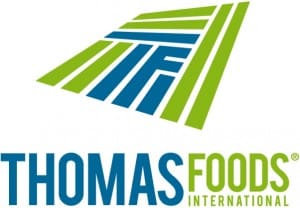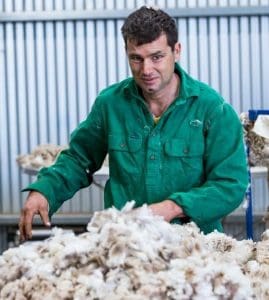 MAJOR meat processor Thomas Foods International is encouraging lamb suppliers to consider voluntary electronic identification of sheep and goats nationally for biosecurity, traceability and market access benefits.
MAJOR meat processor Thomas Foods International is encouraging lamb suppliers to consider voluntary electronic identification of sheep and goats nationally for biosecurity, traceability and market access benefits.
Victoria is the only state to mandate electronic tagging of sheep and goats, while interstate farmer bodies continue to support the current mob-based visual tag National Livestock Identification System.
However, the South Australian-based processor, with plants in SA and New South Wales, believes electronic identification will have value-based payment, biosecurity and market access advantages, with more customers requiring improved traceability.
TFI’s national small stock manager Paul Leonard said there was no doubt that the mandatory Victorian EID model has worked.
“What it has done is it has proven that it is possible, that it can be done.”
Mr Leonard said TFI was not advocating that EID for sheep and goats be made mandatory nationally.
“But we would be encouraging producers to certainly considering going voluntary.”
TFI is getting sheep plants EID-ready
TFI is currently making their sheep facilities EID-ready, although the sheep and lamb processing sector did not yet have the tools for value-based payment of producers for meat yield and eating quality, he said.
However, Mr Leonard said global customers are continually setting further requirements for details on the pasture and feeding history of livestock, including lambs.
“More and more people are requiring more information.”
“EID or any form of electronic traceability that’s considered to be more transparent than the current paper trail is only going to be good for the industry,” he said.
“If it helps us from the traceability point of view, in that we can guarantee our global customers the integrity, history and origin of the lambs, it is only going to benefit lamb producers.”
Victorian lamb producers can give an ‘EID guarantee’
Mr Leonard said TFI is competing at the retail level with Victorian lamb producers who can guarantee that their lambs have been purchased through an EID system.
“I don’t think there is any doubt that moving forward that for any of these things to work properly you do need to have it on a national level.
“I have no doubt that sometime up the track it (EID in sheep) will become an Australia-wide initiative,” he said.
Mr Leonard said some customers could stipulate that they only want EID-tagged lambs.
“And if that was the case, the processors who would be able to best fit those requirements would be those in Victoria.
“So you could argue that the other states could be potentially precluded from some markets if they were not able to offer the same assurances that Victoria could.”
Mr Leonard said initially there were a few European customers who wanted lamb traceability and assurance.
“What five years ago was considered an expectation from some individual global customers, particularly high-end retail, is now becoming more the norm, right across the whole retail chain.
“EID can only help bring all this in together – if you’ve got EID you can tick the boxes on a lot of those things in one hit, rather than having paper trail, statutory declarations or TFI guarantees that they have been grass or grain-fed.
“EID in itself carries currency.”
EID will enable whole-of-life traceability
He said an EID system would enable Australia to “tick the box” on biosecurity and whole-of-life traceability.
“Thirdly for producers to be able to participate in a value-based payment system, there will be a requirement for them to be EID-compliant to trace the carcase through the processing stage so that we can then remunerate people on carcase traits.”
“So for those three reasons, it is difficult to see any downside, that’s my opinion.”
Mr Leonard said TFI is certainly encouraging its producer clients to consider voluntarily tagging their sheep and lambs with electronic tags.
He believes EID traceability would potentially benefit the integrity of lambs sold through the saleyard system if linked to lamb background.
Feedback and premiums would give a “case for change”

Chair of the NSW Farmers Sheep Committee Floyd Legge.
Chair of the NSW Farmers Sheep Committee Floyd Legge recently reinforced NSW Farmers support for the mob-based system continuing as “a proven and effective traceability tool.”
“NSW Farmers stands by its current policy that RFID’s can used as a management tool, but must not be a mandatory impost on farmers,” he said.
Mr Legge uses EID tags in his Poll Dorset stud sheep and would soon introduce it into his commercial Merino flock for fleece data collection and individual sheep management, but believed there were insufficient market or feedback signals to justify this in his terminal Poll Dorset cross lambs which are mainly sold at the Forbes saleyards.
“I haven’t heard any market signals that the Victorian processors aren’t going to come to New South Wales to buy lambs.
“The only thing would if the processors started to give better feedback on lambs and then there might be more reason to look at that RFID (radio frequency identification or EID tag) option, but until there is true market signals that there is economic advantage to do so we wouldn’t consider doing it in our commercial sheep,” he said.
Mr Legge doesn’t see any need to change to electronic tags until genuine export market issues arise. He said there was a need for more work to improve the integrity of the cattle EID system before “multiplying” EID sheep entries on the NLIS database and potentially confusing traceback in the case of an exotic disease outbreak. He said there would be “pushback” on mandatory EID in New South Wales until tangible benefits were presented.
“A big one, which all of us need to be working together on, is putting the pressure on the processors to start giving us feedback on lambs.
“Once DEXA is rolled out in all meat works, then the case for change will be there, because farmers will be able to be paid a genuine premium on the lamb they are selling and there can be actual feedback and potential pressure put on stud producers to ensure they are breeding the correct ram to produce the best lamb,” he said.
“Until there is a real premium and feedback from the abattoirs there is no way to capture that additional profit from RFIDs.”
Livestock SA is also continuing to support the NLIS mob-based system, but is continuing to monitor development of Victoria’s EID system. Livestock SA president Joe Keynes said the body wanted to undertake its own inspection of the Victorian system.
Sheep Producers Australia is also maintaining support for the voluntary uptake of electronic identification of sheep, although SPA chief executive officer Graham Smith supports having one traceability system for sheep and lambs across Australia, and preferably based on electronic livestock identification.

HAVE YOUR SAY